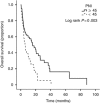A novel, externally validated inflammation-based prognostic algorithm in hepatocellular carcinoma: the prognostic nutritional index (PNI)
- PMID: 22433965
- PMCID: PMC3326674
- DOI: 10.1038/bjc.2012.92
A novel, externally validated inflammation-based prognostic algorithm in hepatocellular carcinoma: the prognostic nutritional index (PNI)
Abstract
Background: There is increasing evidence that the presence of an ongoing systemic inflammatory response is a stage-independent predictor of poor outcome in patients with cancer. The aim of this study was to investigate whether an inflammation-based prognostic score, the prognostic nutritional index (PNI), is associated with overall survival (OS) in patients with hepatocellular carcinoma (HCC).
Methods: All patients with a new diagnosis of HCC presenting to the Medical Oncology Department, Hammersmith Hospital between 1993 and 2011 (n=112) were included. Demographic and clinical data were collected. Patients in whom the combined albumin (g l(-1)) × total lymphocyte count × 10(9) l(-1) was ≥45, at presentation, were allocated a PNI score of 0. Patients in whom this total score was <45 were allocated a score of 1. Univariate and multivariate analyses were performed to identify clinicopathological variables associated with OS. Independent predictors of survival identified on multivariate analysis were validated in an independent, stage-matched cohort of 68 patients.
Results: Univariate analyses showed that PNI (P=0.003), intrahepatic spread (P<0.001), the presence of extrahepatic disease (P=0.006), portal vein thrombosis (P=0.02), tumour multifocality (P=0.003), alfa-fetoprotein >400 ng ml(-1) (P<0.001) and Barcelona Clinic Liver Cancer score (P<0.01) were all predictors of OS in the training set. Multivariate analysis revealed the PNI (P=0.05), presence of extrahepatic disease (P<0.001) and degree of intrahepatic spread (P<0.001) as independent predictors of worse OS in this population. The PNI retained independent prognostic value in the validation set (P<0.001).
Conclusion: The presence of a systemic inflammatory response, as measured by the PNI, is an independent and externally validated predictor of poor OS in patients with HCC.
Figures
Similar articles
-
Prognostic value of combined preoperative prognostic nutritional index and body mass index in HCC after hepatectomy.HPB (Oxford). 2017 Aug;19(8):695-705. doi: 10.1016/j.hpb.2017.04.008. Epub 2017 May 3. HPB (Oxford). 2017. PMID: 28479010
-
Prognostic nutritional index predicts short-term outcomes after liver resection for hepatocellular carcinoma within the Milan criteria.Onco_target. 2016 Dec 6;7(49):81611-81620. doi: 10.18632/onco_target.13151. Onco_target. 2016. PMID: 27835570 Free PMC article.
-
The role of PNI to predict survival in advanced hepatocellular carcinoma treated with Sorafenib.PLoS One. 2020 May 7;15(5):e0232449. doi: 10.1371/journal.pone.0232449. eCollection 2020. PLoS One. 2020. PMID: 32379785 Free PMC article.
-
Lymphocyte to monocyte ratio and prognostic nutritional index predict survival outcomes of hepatitis B virus-associated hepatocellular carcinoma patients after curative hepatectomy.J Surg Oncol. 2016 Aug;114(2):202-10. doi: 10.1002/jso.24297. Epub 2016 May 20. J Surg Oncol. 2016. PMID: 27199001
-
Onodera's prognostic nutritional index is a strong prognostic indicator for patients with hepatocellular carcinoma after initial hepatectomy, especially patients with preserved liver function.BMC Surg. 2020 Oct 31;20(1):261. doi: 10.1186/s12893-020-00917-2. BMC Surg. 2020. PMID: 33129309 Free PMC article.
Cited by
-
Novel immunological and nutritional-based prognostic index for gastric cancer.World J Gastroenterol. 2015 May 21;21(19):5961-71. doi: 10.3748/wjg.v21.i19.5961. World J Gastroenterol. 2015. PMID: 26019461 Free PMC article.
-
Prognostic Nomogram for patients undergoing radical Pancreaticoduodenectomy for adenocarcinoma of the pancreatic head.BMC Cancer. 2021 May 27;21(1):624. doi: 10.1186/s12885-021-08295-5. BMC Cancer. 2021. PMID: 34044806 Free PMC article.
-
Is the prognostic nutritional index a prognostic and predictive factor in metastatic non-small cell lung cancer patients treated with first-line chemotherapy?Support Care Cancer. 2020 May;28(5):2273-2282. doi: 10.1007/s00520-019-05055-x. Epub 2019 Aug 30. Support Care Cancer. 2020. PMID: 31471631
-
The prognostic value of the advanced lung cancer inflammation index in patients with gastrointestinal malignancy.BMC Cancer. 2023 Jan 30;23(1):101. doi: 10.1186/s12885-023-10570-6. BMC Cancer. 2023. PMID: 36717809 Free PMC article.
-
Significance of neutrophil-to-lymphocyte ratio, platelet-to-lymphocyte ratio, lymphocyte-to-monocyte ratio and prognostic nutritional index for predicting clinical outcomes in T1-2 rectal cancer.BMC Cancer. 2020 Mar 12;20(1):208. doi: 10.1186/s12885-020-6698-6. BMC Cancer. 2020. PMID: 32164623 Free PMC article.
References
-
- Andreyev HJ, Norman AR, Oates J, Cunningham D (1998) Why do patients with weight loss have a worse outcome when undergoing chemotherapy for gastrointestinal malignancies? Eur J Cancer 34(4): 503–509 - PubMed
-
- Argiles JM, Busquets S, Lopez-Soriano FJ (2003a) Cytokines in the pathogenesis of cancer cachexia. Curr Opin Clin Nutr Metab Care 6(4): 401–406 - PubMed
-
- Argiles JM, Moore-Carrasco R, Fuster G, Busquets S, Lopez-Soriano FJ (2003b) Cancer cachexia: the molecular mechanisms. Int J Biochem Cell Biol 35(4): 405–409 - PubMed
-
- Berasain C, Castillo J, Perugorria MJ, Latasa MU, Prieto J, Avila MA (2009) Inflammation and liver cancer: new molecular links. Ann NY Acad Sci 1155: 206–221 - PubMed
-
- Bruix J, Sherman M (2005) Management of hepatocellular carcinoma. Hepatology 42(5): 1208–1236 - PubMed
Publication types
MeSH terms
LinkOut - more resources
Full Text Sources
Medical


